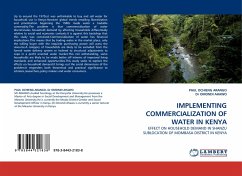Commercialization of service sectors worldwide has been impeded by a number of factors that include the inability of stakeholders to undertake an effective holistic change in line with the organizational change. Therefore, this has led to the need of understanding how commercialization of water services has affected employee work culture and in relation to how work culture affects the availability of services offered. Using qualitative and quantitative approaches, the author of this book establishes how commercialization of water services affects the work culture. George argues that the commercialization of water services in Eldoret, Kenya, has had an overall positive effect on the attitude of the employees, managers and customers. The author suggests that commercialization improves the work culture of newly commercialized enterprises and leads to increased positive work culture. He further opines that commercialization has direct benefits on the work culture of an organization. This book is a must-read for administrators of newly formed water companies and scholars of Water and Sanitation Studies in Kenya and elsewhere in the world.
Bitte wählen Sie Ihr Anliegen aus.
Rechnungen
Retourenschein anfordern
Bestellstatus
Storno








